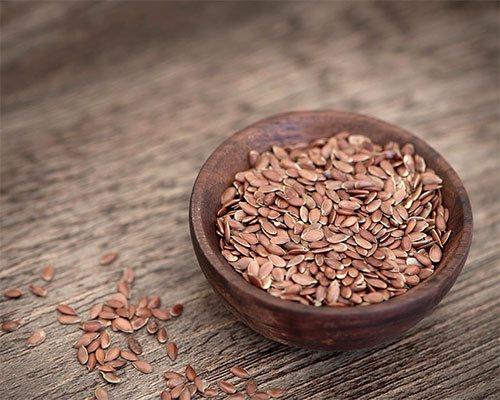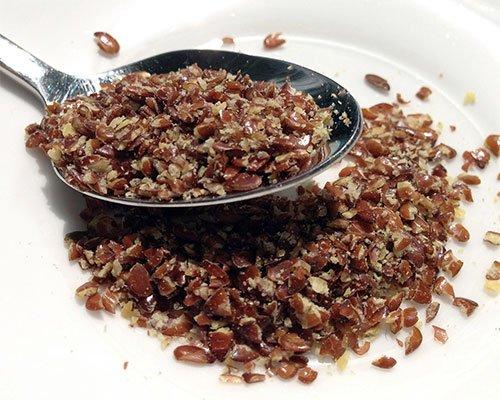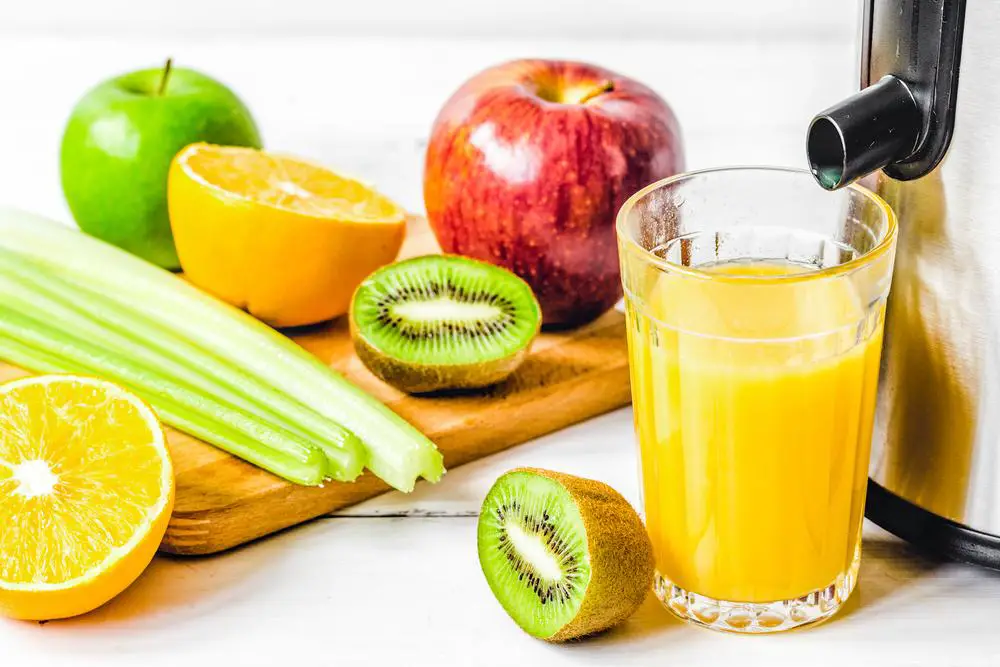Updated March 2021
Eating healthy and losing weight the right way doesn’t have to be an expensive and bland task. Thi is a nutrient-packed superfood available that is affordable and can greatly improve and benefit our health. Using flax seeds for weight loss is only the start of what these tiny seeds can do for you.
The nutty and shiny seeds have hundreds of health-benefiting qualities and an earthy aroma. Apart from the flax seed benefits for weight loss, they are a great source of omega-3, which is a vital nutrient for all of us.
They also contain fiber, lignans (plant estrogen and antioxidant qualities), and omega-3 fatty acids—the good fats with hearty, healthy qualities.
And if that was not enough to convince you, here is more on flaxseed and flax seed benefits.
What Are Flax Seeds?
Although a lot has been said about flax seed and flaxseed oil, many people still do not know exactly what flax does and specifically what it is.
Flax (also known as common flax or linseed) is a fiber crop cultivated in cooler regions of the world.
Here is the plant itself:

It is a great source of omega-3, dietary fiber, and many other important nutrients including potassium.
The seed’s nutrient composition differs considerably from that of other popular oil seeds like sunflower and canola.
Flax seeds contain about 40 percent oil, and 55 percent of the oil is an omega-3 fatty acid. It is these properties (omega-3 fatty acids, high fiber content, and potassium) that have attracted nutritionists worldwide and those seeking healthier diets.

Flax seeds have been traditionally used in a variety of ways including cracked, whole, or ground into flour for baking purposes. Today they are found in fruit juice and in oil form that can be sprinkled over salads and some breakfast cereals. Another common use is blending the seeds into a smoothie.
Despite the seed being used for so long, the possible weight-loss benefits of flax seeds are only recently being discovered. Flax seeds are usually found in keto diets as well as plant-based diets as a source of healthy fats instead of consuming fatty fish.
Some Flax Seed Benefits:
- Aids In weight loss — The seed helps you get rid of wastes and food quickly due to the high fiber content, which helps in detoxification and weight loss.
- Relieves constipation and diarrhea — It acts as a natural lubricant to the colon, which offers constipation relief.
- Helps fight colon, prostate, and breast cancer — Studies show that it considerably reduces cancer cell creation rates by disrupting the entire process of cancerous cell production.
- Depression — Although there are many medications that doctors can prescribe for depression, simply adding flaxseed to your food may also help. How? Many people who suffer from depression have lower levels of eicosapentaenoic and docosahexaenoic, the same type of acids found in walnuts, fish, and flax seeds.
- Reduces eczema —The omega-3 fatty acids in the seed help enhance skin texture and elasticity.
- Boosts heart health — The alpha-linolenic acid in the seed helps treat and prevent heart disease.
- Helps maintain hormone levels — For women, flax seed helps maintain hormone levels and minimize the hot flashes associated with menopause.
- Decreases the risk of osteoporosis — The seed helps prevent bone loss and increases bone density.
- Boosts the immune system — The lignans and the alpha-linolenic acid found in the seed’s oil promote a well-functioning immune system.
- Promotes kidney function
- Lowers blood sugar levels and pressure
- Reduces insulin resistance
- Helps alleviate rheumatoid arthritis symptoms
- Contributes to good cholesterol levels — They are low in bad cholesterol or lipoprotein.
- Reduces inflammation — It is anti-inflammatory because of its gluten-free properties.
- Aids with digestion
- Suppresses hunger — As a good source of fiber, the seed helps you feel less hungry
How Your Body Can Benefit From Flax Seed
Flax seeds have been around for centuries.
These seeds will help you improve digestion, reduce sugar cravings, give you clear skin, balance your hormones, lower your cholesterol levels, promote weight loss, and fight cancer.

And that is just the beginning of good things to come! It is also rich in omega-3, high in fiber, a good-quality protein, a great antioxidant, and awash with lignans.
Flaxseed Oil Vs Fish Oil
Any experienced expert will tell you that whole foods are better than supplements.
Nonetheless, just like flaxseed oil, fish oil has benefits, too. It contains selenium, iodine, B vitamins, and protein.
Whole flaxseed oil on the other hand contains omega-3. So which is better? Apart from just the oil, whole flaxseeds also contain fiber and lignans. By eating whole flax seeds, you will be using one stone to kill many birds.
Besides, supplements are usually very expensive, and eating them whole will provide you with a wide range of nutrients that fish or flaxseed oil cannot.
How To Eat Flax Seeds For Weight Loss
You can easily buy flax seeds in grocery stores and natural food stores. They are more nutritious when eaten whole and are normally the cheaper option.
To enjoy the weight loss benefits of flax seeds, you should consume a tablespoon of ground flaxseeds every day. This is enough to help you lose belly fat and provide you with the right amount of nutrients your body needs.
So ideally, just buy them whole and then grind them in your blender or a coffee grinder for maximum benefits. Grinding the seeds will release the healthy oils, making it easier for your body to absorb them.
Once you have ground the seeds, known as flaxseed meal now, weight loss is only one of the benefits you will notice when you add this to your food.
This way, you will easily enhance your fiber and omega-3 intake. You can add them to your food, eat them as a capsule, or eat them alone.
You can also sprinkle them on cereal, yogurt, veggies, fruits, cookies, bread, and homemade muffins.
The seed is also sometimes used as an egg substitute in baked products or to bulk out meal dishes for people who don’t like, or are allergic to, eggs. There are many ways of incorporating these heaven-sent seeds into your diet.
Nonetheless, one question that many people ask when trying to add the seed into their diet is, does baking affect the omega-3 in the seed?
No. Research shows that baking the seeds at 300F for about three hours doesn’t have any effect on the ALA or omega-3s.
Tips for incorporating flax seeds in your daily diet:
- Add two to three tablespoons to your morning smoothie
- Mix one to two tablespoons with raw honey or yogurt
- Bake them into bread, cookies, and muffins
- Mix with water and use them as a healthier alternative to eggs

Flax seed is a great addition to Humus!
Flaxseed is also a great addition to hummus! There is absolutely no doubt that flaxseed is a superstar food.
It is awash with many benefits. Consuming the seeds daily can be very beneficial to your health.
Precautions When Consuming Flax Seeds Regularly
While consuming flax seeds is generally safe as part of a well-balanced diet, there are a few things to take note of with these healthy seeds.
Don’t Eat Unripe Flax Seeds
Flax seeds do contain traces of toxic chemicals, which are more prominent in the unripened flax seeds. These toxins are known as cyanogenic glycosides and their levels decrease when the seeds ripen.
Extra caution should be taken if you have adverse health problems such as diabetes, thyroid problems, or blood clotting, as certain medications may react negatively with the seeds.
They Won’t Substitute For A Healthy Diet
There are some damaging claims online stating that drinking flaxseed meal mixed with water a few times a day will have you shredding the pounds in no time.
Flax seeds on their own cannot substitute for a healthy diet and should be consumed as an additional topping to your healthy meals if you truly want to gain the benefits from them.
Drink A Lot Of Water
If you are consuming more flax seeds than your body is used to, you should increase your water intake also. The seeds are high in protein and dietary fiber, which causes more regular bowel movements.
Drinking an adequate amount of water will help prevent your body from dehydrating and will aid in the process of your body breaking down and digesting the fiber.
Flax Seeds Weight Loss FAQs
Do Flax Seeds Help With Weight Loss?
Flax seeds are naturally packed full of monounsaturated fats, which are the healthy fats your body needs. These seeds can help lower your cholesterol levels and reduce your overall body fat percentage.
As with any food, flax seeds won’t reduce belly fat on their own. However, they have several benefits including anti-inflammatory properties, they are a great source of fiber, and they add omega-3 to your diet.
They are usually consumed as part of a plant-based diet, and adding them to a well-balanced diet will give you positive benefits and provide you with essential nutrients.
How Much Flaxseed Should You Eat In A Day?
There isn’t a specific amount of flax seeds you should consume in a day; however, adding 1-2 tablespoons to your meals throughout the day will provide your body with the healthy benefits of these seeds.
The Last Bite
There are numerous advantages to adding flax seeds to your healthy diet, and this goes beyond adding flavor and texture to your foods. Enjoy the health benefits of these small, affordable seeds, too.
Adding them in moderation to your daily diet will provide you with necessary nutrients and essential fatty acids, especially if you are consuming a predominantly plant-based diet.
These versatile seeds can be added to almost anything, and usually work well as garnishing to your meals, so why not go and try them out today?




Great post, really covers the health benefits of flax seed comprehensively 🙂
I’ve become a big fan of flax seed lately and I try to add it to my smoothies and smoothie bowls whenever I can now 🙂